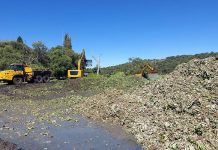The WaterbErg District Agricultural Union (DAU) has rejected the Bela Bela municipal budget for 2008/09 and has asked the minister of Provincial and Local Government, Sidney Mufamadi, to intervene by putting an end to the municipality’s unlawful implementation of the Municipal Property Rates Act. rancois du Toit of the Waterberg DAU said the Bela Bela Municipality is putting business sustainability at risk by raking in profits through the unlawful implementation of the Act.
He said the municipality had deliberately ignored guidelines and legislation set out by government regarding the Act. or the year 2006/07, the total income raked in by the municipality was over R15,5 million, for 2007/08 it was R21,9 million, and for 2008/09 it was R35 million, representing a 160% increase in the past year.
“And despite protests by other stakeholders over this issue, the municipality went ahead and budgeted for the 2008/09 financial year, imposing a 0,0095 cent in a rand increase for all categories of property,” Du Toit said. As a result, the agricultural sector is being overcharged by 400%. “This is totally unacceptable and has therefore been rejected,” said Du Toit. The Department of and Government’s draft notice proposed that agricultural property be valued at 25% less than residential property, and business and industrial property should at least be twice the value of residential property.
Chris Wagner, the acting chairperson of the Waterberg DAU, pointed out that, as stated in the Act, because no services are rendered on farms they can’t be evaluated against similar properties in town. Wagner said the municipality had also failed to comply with national economic policies, increasing the upward pressure on inflation. In its Monetary Policy Review of May 2008, the Reserve Bank had indicated municipalities are having a massive influence on rising inflation rates. The inflation target government has set for the Bank is between 3% and 6%.
Wagner said the municipality had given no consideration to its policies’ social and economic impact on the community, and neither was the matter negotiated with the affected sector. I n a letter addressed to the municipal manager dated 29 May 2008, the Waterberg DAU had warned the municipality that further steps would be taken if the budget was not amended. Wagner said they intend asking finance minister Trevor Manuel to intervene as well. At the time of going to print, the Bela Bela Municipality could not be reached for comment. – Peter Mashala
SADC free trade zone could benefit SA farmers
The Southern African Development Community (SADC) member states officially launched a free trade area during the recent 28th SADC Summit in Johannesburg. This is expected to create a regional market worth US$360 million (more than R2 billion) which will include 170 million people, all living in economies that are growing at 7% annually. SADC members who are included in the free trade area are Botswana, Lesotho, Madagascar, Malawi, Mauritius, Mozambique, Namibia, South Africa, Swaziland, the United Republic of Tanzania, Zambia and Zimbabwe.
At the time of going to press, producers and consumers won’t be paying tariffs on 85% of all trade on goods in the initial 12 countries. Angola and the DRC will join at a later stage. “We must intensify our collective efforts to build and diversify the region’s productive capacity to expand the range of products that can be traded,” said SA President Thabo Mbeki, who is the new SADC chairperson.
He noted that the region’s biggest problem is under-developed infrastructure and the lack of supply capacity. The SADC free trade area programme plans to establish a customs union by 2010, a common market by 2015, a monetary union by 2016 and a single currency by 2018. Larger economies of scale and reallocation and best use of resources are some of the advantages for member states, who will be able to produce for a far larger market than their domestic ones, Mbeki said.
“Generally, the positives should outweigh the negatives of the free trade area,” commented Neels Ferreira, chairperson of Grain SA. Agricultural activities differ vastly between the member states and we need to look carefully at that,” he said, referring to the fact that SA producers are competing against First World countries, which are protected by subsidies from their governments.
Lindie Botha, an economist at the Agricultural Business Chamber, agreed with Ferreira, saying that the agricultural development should be managed carefully. Dr Mohammad Karaan, agricultural economist at the University of Stellenbosch added, “When comparing SA’s balance of trade with these other countries, it’s vastly in our favour, meaning lots of exports from our side and very few imports from them to us.” – Wouter Kriel








